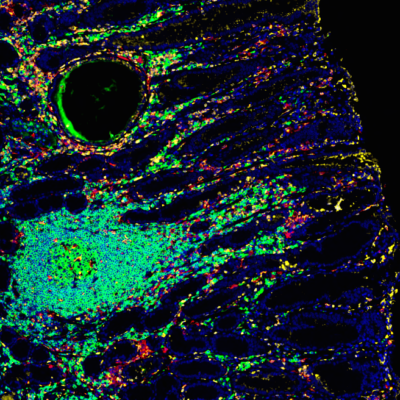Linking a common stomach bug to gastric cancer
By Hudson Institute communications
Why does a common bug, Helicobacter pylori, which is present in the stomachs of around half the world’s population, drive stomach cancer in some people?
Associate Professor Richard Ferrero will establish how this seemingly innocuous bacterium drives growth of a specific type of stomach tumour, thanks to generous funding from the US Department of Defense.
A/Prof Ferrero’s team, including PhD student Michelle Chonwerawong, BMedSci student Chloe Higgins and postdoctoral researcher Dr Le Son Tran, has uncovered a protein that could protect against one type of stomach cancer, called stomach MALT lymphoma, in people with H. pylori infection.
“Our research will determine how H. pylori infection leads to stomach MALT lymphoma in some people. In addition we will trial therapies used in other blood cell disorders to find new treatments for this type of cancer,” A/Prof Ferrero says.
Rethinking approaches
H. pylori lives in the stomach, where it causes inflammation. Most people with the bug have no symptoms, but in some people, long-term infection can lead to stomach cancer – what’s not well understood is why.
“It is well known that H. pylori infection is the major cause of stomach MALT lymphoma and if the disease is detected early enough, antibiotic treatment can shrink these tumours. What’s not well known is what causes these tumours to form in the first place.”
“Although antibiotics are available to treat H. pylori infection, the rise in antibiotic resistance means many of these treatments are becoming less effective. We need to rethink our approaches.”
Protein protects against stomach cancer
This particular type of lymphoma is linked to the multiplication of white blood cells, which flood the lining of the stomach walls.
Importantly, A/Prof Ferrero’s team has shown in mice that one particular host protein helps to protect against MALT lymphoma by preventing this proliferation of white blood cells in the stomach.
“With this Department of Defence grant, we will aim to show that this host protein, found in a population of immune cells known as macrophages, can regulate the formation of MALT lymphoma tumours in those with Helicobacter pylori infection,” A/Prof Ferrero says.
New therapies
The team will also trial therapies used in other blood cell disorders to develop better treatments, and is working towards non-invasive detection of stomach MALT Lymphoma.
“Treatment options for stomach MALT lymphoma are currently limited and have bad side-effects. We need to identify other treatments that may be used alone or in conjunction with antibiotic therapies,” A/Prof Ferrero says.
Contact us
Hudson Institute communications
t: + 61 3 8572 2697
e: communications@hudson.org.au
About Hudson Institute
Hudson Institute’ s research programs deliver in five areas of medical need – inflammation, cancer, reproductive health, newborn health, and hormones and health. More
Hudson News
Get the inside view on discoveries and patient stories
“Thank you Hudson Institute researchers. Your work brings such hope to all women with ovarian cancer knowing that potentially women in the future won't have to go through what we have!”







